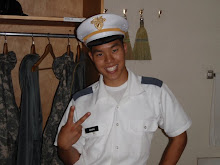It was an honor to host Jeff Immelt, the CEO of GE, at West Point last week. Mr. Immelt holds worldwide acclaim as a great business leader, and also as a committed leader developer, earning him a kinship with those of us who view leader development as a calling. He was generous in spending time with cadets, and his optimistic speech about renewing American leadership went far beyond a pep talk and vision for GE. It was a rallying cry for the institution of American business to step up and, in concert with the public sector, lead an American renewal.
Why West Point?
Perhaps the most profound rhetorical question in Mr. Immelt's speech was: "Who will lead us?" The simple answer is, "Those we teach to lead." Frances Hesselbein, West Point's Class of 1951 Chair for the Study of Leadership, is fond of saying that there are two institutions that sustain our democracy--one is public education, and the other is the U.S. Army. Her point is that national security sets the conditions for an educated populous to self determine. It is revealing that Mr. Immelt's speech imploring business to set the conditions for American renewal was at the United States Military Academy--a place of public education in the interest of national security, with the mission of sustaining democracy.
This choice of West Point as a venue may be puzzling to the global business community--the militaries of China, India, and other global economic powers are vastly different in capability and culture from our highly professionalized, all-volunteer force. Therefore, those who view the military through the lens of a different national experience may find it hard to believe that our Army could harbor thought leaders in organizational development, or that the Army and business could share common approaches to leadership.
Even though Mr. Immelt offered statistics validating military officership as a trusted profession, there is a disdain for the stereotype of military leadership--a disdain that, ironically, we share. There is really no such thing as military leadership, though for some reason people find it appealing to try to cast leadership performed in a military context into a stereotypical caricature: hierarchical, inflexible, and structured. In truth, the things that people look for in leaders they choose to follow are the same across situations.
For years, our Army's operating environment has demanded less hierarchy, more flexibility, and better adaptation in structure. Under the gun (figuratively or literally), people are people, and we should listen to each other. The first point in Mr. Immelt's renewal paradigm is that we need to be better listeners, and his presence at West Point is a fantastic example of the military and business listening to each other. It's a great value proposition--listening doesn't require a program.
Getting beyond leadership programs
In fact, West Point has nothing that remotely resembles a "leadership program." Instead, every element of the enormously complex experience--academic, military, athletic, social, ethical, spiritual-- integrates leadership into the personally held, self identity of each cadet. West Point is the manifestation of systems thinking, applied to leader development. Everyone, from chemistry professors to the seamstresses at the uniform shop, understands that our aim is to produce officers for our Army whose self concepts will drive them to lead in all aspects of their personal and professional lives.
Mr. Immelt's call for "systems thinkers who are comfortable with ambiguity" aligns perfectly with our process for developing cadets. In our case the context is military, but the process of identity development is pervasive among high performing people and organizations. I was recently privileged to visit Rosie's Broadway Kids, an arts education organization dedicated to enriching the lives of children through the arts. Developing leaders is not a part of their mission statement.
Yet at Rosie's, young people from all backgrounds achieve excellence, serve as role models, hold each other to high standards, and develop identities that will guide their actions and define who they are, whether they pursue a career in the arts or find another purpose in life. Rosie's Broadway Kids is about as un-military as an organization can be, yet develops leaders in fundamentally the same way West Point does.
People live and work better when they have a purpose beyond themselves, and there is a fire starting in American business that values purpose beyond profit, closely aligned with the values of Duty, Honor, Country. As West Point helps build our Army's officer corps, we share a view that puts leadership at the heart of all human endeavors. We're eager to continue the dialogue within our military, with the arts, education, business, and all the elements of our national character, on how leadership can move our country forward. Together, we can realize the vision of a new cadre of leaders to change our world.
Note: The views expressed in this article are those of the author and do not reflect the official policy or position of the Department of the Army, Department of Defense, or the U.S. Government.






2 comments:
Good post.
really love you blog you did very great job imported books online store in Pakistan i read it with great interest
Post a Comment